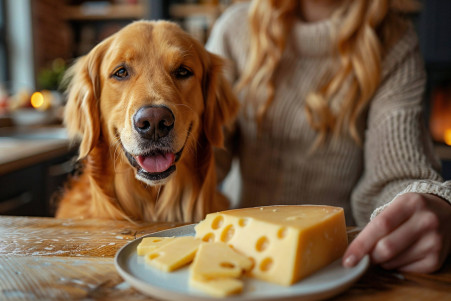Can Dogs Have Provolone Cheese? Here's What a Vet Says
5 April 2024 • Updated 4 April 2024

Although many dog owners know that cheese can be hard to resist for their pets, it's important to take a closer look at whether or not dogs can have provolone cheese. Because provolone is a low-lactose cheese, it's safe for dogs to eat in small amounts, but the high fat and salt content could cause digestive issues or even contribute to obesity if it's given to dogs too often.
In order to give you a complete picture, we've delved into the research from veterinary nutritionists and other trusted sources of pet health information. Their insights can help you better understand how much provolone cheese is okay to give your dog, as well as the potential pros and cons of making it a regular part of their diet. After considering the facts, you'll be better equipped to decide whether or not you want to give your dog this tasty cheese as an occasional treat.
Can dogs eat provolone cheese?
Nutritional Benefits and Risks of Provolone for Dogs
Provolone cheese can offer some nutritional benefits to dogs, including protein, calcium, and other essential nutrients that support good health. The American Kennel Club explains that cheese is a good source of protein, calcium, vitamin A, essential fatty acids, and B-complex vitamins. The protein in provolone can help with muscle growth and repair.
That said, provolone's high fat and sodium levels can lead to health problems if it's eaten in large amounts. As Hills Pet Nutrition points out, fatty foods like cheese can lead to weight gain, obesity, and even pancreatitis in dogs that are predisposed to the condition. The ASPCA also explains that dogs don't have enough lactase to digest dairy products, which can lead to digestive issues.
Even though provolone's soft texture and tangy taste may make it an attractive snack, it's important to feed it in moderation. Dogs for Vets notes that a single slice of provolone contains about 98 calories, 7.5 grams of fat, and 250 milligrams of sodium, which can add up quickly if you feed your dog too much. Provolone can also be used to hide pills, but its high fat content can interfere with some medications.
Owners should talk to their vet before giving their dog provolone or any other new food, especially if their dog has a condition like obesity, pancreatitis, or lactose intolerance. This will help them take a balanced approach that takes into account both the potential benefits and drawbacks of giving their dog provolone so that they can make sure it's a good choice for their furry friend.
Other Dog-Friendly Cheese Options and Substitutes
If you want to give your dog cheese, provolone can be a good option in moderation, but there are other types of cheese that may be even better, according to Best Bully Sticks. It explains that low-fat cheeses like cottage cheese, mozzarella, and cheddar are generally better options because they have lower fat and sodium levels. However, it warns against blue cheese, feta, and cheeses with added ingredients like garlic or onions, which can be toxic to dogs.
Purina recommends lactose-free cheese for dogs that are lactose intolerant or have sensitive stomachs, and it also says that non-dairy treats like carrots or peanut butter can be good alternatives. However, as PetMD points out, you should always watch for signs of allergies or digestive issues when you give your dog a new food.
Portion Control and Moderation of Cheese as a Dog Treat
Cheese can be a healthy treat for dogs, but it should be given in moderation because of its high fat and calorie content. According to Best Bully Sticks, many veterinarians suggest that no more than 10% of a dog's daily caloric intake come from cheese. Portion sizes should be small, with a rule of thumb being no more than a few small cubes or a tablespoon of shredded cheese per treat.
It's also important to watch how a dog reacts to cheese and adjust portion sizes accordingly, as some dogs are more lactose intolerant than others. Hills Pet Nutrition notes that overconsumption of cheese can cause gastrointestinal upset, including diarrhea, vomiting, and gas, as well as lead to weight gain and pancreatitis. BeChewy also points out that dogs with a history of pancreatitis should avoid cheese.
By knowing the right portion sizes and using moderation, dog owners can give their pets cheese as a treat while keeping an eye on their pet's specific needs and health.
How to Tell If Your Dog Is Allergic to Cheese
While cheese is generally safe for dogs, some dogs may be allergic or sensitive to it. According to WagWalking, signs of a cheese allergy in dogs include digestive problems such as diarrhea and vomiting, as well as skin problems such as redness and itching. Some dog breeds are more likely to develop food allergies, with the Autumn Trails Veterinary Clinic reporting that Boxer, Springer Spaniel, Dalmatian, German Shepherd, Miniature Schnauzer, Retriever Cocker Spaniel, Coolie, and Lhasa Apso breeds are more susceptible. Dogs that are older are also more likely to develop food allergies, according to Rover.com.
Veterinarians may recommend an elimination diet trial and allergy testing to diagnose a cheese allergy, according to VCA Animal Hospitals. If your dog is allergic to cheese, the only way to treat the allergy is to avoid feeding your dog cheese and other dairy products and manage the symptoms that remain, per Pooch & Mutt. Dogs that are sensitive to dairy may be able to tolerate lactose-free cheese or non-dairy treats.
Dog owners can keep their pets safe and healthy by learning about the signs of cheese allergies and working with their vets to address their dogs' dietary needs.
Conclusion: How to Safely Feed Provolone Cheese to Your Dog
For most dogs, provolone cheese can be a safe and occasional treat as long as it is fed in moderation. However, it's also important to be aware of the potential downsides, including gastrointestinal upset, weight gain, and allergies. Pet owners should talk to their vet, especially if their dog has any underlying health issues or dietary needs. For some dogs, it may make sense to opt for low-fat cheese or a non-dairy alternative.
By learning about the nutritional content, portion sizes, and potential downsides, pet owners can make the best choices about whether or not to include provolone cheese in their dog's diet. It's also important to take a balanced approach that prioritizes the dog's health and well-being when introducing new foods.


